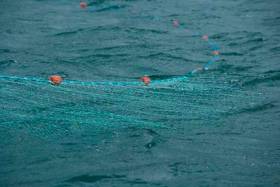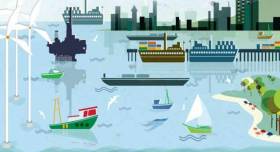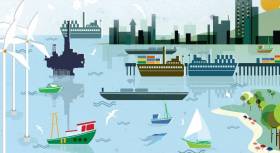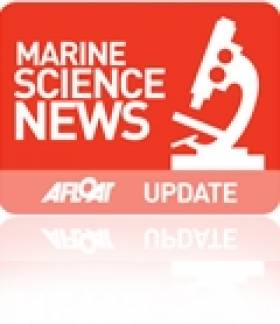Displaying items by tag: spatial
Single System of Marine Consents May Exclude Key Marine Activities
A Government plan to streamline marine planning and consent has been stymied by refusal of one key department to become involved writes Lorna Siggins
A new “one stop permit shop” for offshore wind farms, ocean energy and other marine activities will not now cover fish farming or sea fisheries.
Minister for Agriculture, Food and the Marine Michael Creed intends to retain responsibility for aquaculture and sea-fisheries related development, his department has confirmed.
As a result, these activities may be omitted from the long-awaited Marine Planning and Development Management Bill, which is due to come before the Oireachtas shortly.
The new legislation billed as “revolutionary”, intends to underpin a single maritime area consent system for economic activity off the coast which avoids conflicts between competing interests.
The failure by Mr Creed’s department to sign up was criticised at a consultation meeting on the Government’ s new national marine planning framework in Galway this week.
Minister of State for Housing and Urban Development Damien English, who is spearheading the new framework, told the meeting his department would be hiring planners with a marine background as part of the approach.
However, the Irish Farmers’ Association (IFA) Aquaculture Executive Teresa Morrisey, who represents fish and shellfish farmers, challenged Mr English to explain why Mr Creed’s department had declined to sign up.
She said that the current system of aquaculture licensing had been acknowledged as not fit for purpose.
“How many government departments does it takes to manage the native flat oyster?"
Mr Diarmuid Kelly of Cuan Beo, the Galway Bay environmental organisation, also highlighted the anomalies when he asked Mr English if he knew “how many government departments it takes to manage the native flat oyster”.
“Seven,” Mr English replied, acknowledging there was an issue of duplication.
“The situation with the Department of Agriculture is not finished yet,” Mr English added, referring to the new legislation.
The national marine planning framework has been hailed by Mr English as a “milestone” and “Ireland’s first complete marine spatial plan”.
Under the associated legislation, maritime area consents will be granted by the Minister for Communications, Climate Action and the Environment for developments such as offshore renewable energy.
The Government’s target of 70% renewable energy by 2030 as part of its climate action plan means Ireland “will have to prepare now for a significant offshore wind capacity in our system”, Minister for Climate Action Richard Bruton said recently.
Maritime area consents for all other development will be granted by the Minister for Housing, Planning and Local Government.
A newly designated “nearshore” area will fall under local authorities, which will regulate “minor activities” such as horse racing on beaches.
Just three months have been given for submissions to the marine planning framework, which is one central piece in a jigsaw designed to meet the EU requirement for national marine spatial plans by 2021.
Mr English’s department is hosting a series of regional consultative meetings around the coast before the submission deadline of February 28th, 2020.
New System of "Strategic Marine Activity Zones" May Result from Draft Marine Plan
"Strategic marine activity zones" may be designated in coastal and offshore waters as part of the Government's new approach to marine planning.
Offshore wind projects will receive "preference" in marine areas zoned for this, a new draft framework published this morning by Minister of State for Housing Damien English states.
Renewable energy projects, commercial fishing, mineral extraction, aquaculture and other competing interests, including tourism, will be covered by a new single system of consent under long-promised revised legislation.
"Offshore wind projects will receive "preference" in marine areas zoned for this"
Ireland is actually one of the largest EU states if over 490,000 square kilometres of seabed off a 7,500 km coastline is taken into account, the draft framework notes.
As Afloat previously reported, Mr English has released the State’s first such framework in draft form today for a three month public consultation period.
Ireland and other EU coastal states are obliged to establish marine spatial plans by 2021 under an EU directive, and Mr English’s department has been assigned as lead in this.
The national marine planning framework aims to take a “co-ordinated” and “coherent” approach to management of “our most important resource”, it says/
The State’s “Harnessing our Ocean Wealth” strategy, has already set two economic targets – doubling the value of ocean wealth to 2.4 per cent of gross domestic product by 2030, and increasing the turnover of the ocean economy to exceed €6.4 billion by 2020.
Academics at NUI Galway’s Socio-Economic Marine Research Unit have reported that Ireland’s “ocean economy” had a turnover at €5.5 billion in 2017.
One single national marine plan will apply to Ireland’s entire maritime area, extending from mean high water mark on the coast to the 200 mile limits of the exclusive economic zone and Continental Shelf.
However, the draft framework says the Government is “committed” to preparation of regional or sub-national plans in future marine spatial policy cycles
The framework will be underpinned by the Government’s Marine Planning and Development Bill, which will replace the existing cumbersome system of foreshore leases and licenses, and will extend beyond territorial waters.
Friction between offshore renewable energy developments and fishing has already taken place in British waters, and the framework aims to plan for competing interests at a time of growing global pressure on marine resources.
Public consultation has already taken place on a baseline report, which elicited 173 responses, and a “strong consensus” emerged that a “hybrid approach” to marine spatial planning, involving zoning for specific activities or zoning certain areas was preferable to “full zoning” of all Ireland’s seas.
Adoption of the final marine planning framework is “expected” to be late 2020. Closing date for submissions on the draft is February 28th, 2020.
The department says it will “not replace or remove existing regulatory regimes or legislative requirements” governing marine sectoral activities, but public bodies will be obliged to take its objectives into account.
When the new legislation is passed, consents will be issued by two departments, depending on remit – the Department of Housing, Planning and Local Government, and Communications, Climate Action and Environment.
Former Environmental Protection Agency (EPA) director Micheál Ó Cinnéide, who is now co-chair of environmental organisation Corrib Beo, welcomed publication of the draft framework.
However, he has questioned why the State’s Marine Institute or a similar experienced body is not being established to provide a secretariat for the plan.
Mr Ó Cinnéide also warned that the plan needs to be given adequate resources, and the department needs to ensure widespread consultation at both regional and local level before final agreement.
“This plan will stand or fall on how well it works in individual coastal bays,” he said.
Regional public events on the draft marine planning framework will open on November 21st in Limerick, continuing to Westport, Co Mayo (Nov 26), Galway (December 2nd), and Tralee, Co Kerry (December 12th), with further events in Killybegs, Co Donegal, Bantry, Co Cork, Dungarvan, Co Waterford, Dublin and Wexford.
Full details are on www.marineplan.gov.ie
Ireland's Maritime Spatial Planning Consultation Underway
Maritime spatial planning for Ireland takes a step closer this year thanks to an EU directive first adopted in 2014. The directive obliges all coastal Member States to establish maritime spatial plans by 2021. Member States, including Ireland, must transpose the Directive into national law by 18th September 2016. The Goverment is seeking submissions but the deadline is less than a month away.
Maritime Spatial Planning (MSP) is a new way of looking at how we use the marine area and planning how best to use it into the future. Marine industry activists have long argued the lack of ability to licence the oceans that surround us has been the biggest obstable to developing the 'blue economy' for Ireland.
MSP will try to balance the different demands for using the sea including the need to protect the marine environment. It's about planning when and where human activities take place at sea. It’s about ensuring these activities are as efficient and sustainable as possible. Maritime spatial planning involves stakeholders in a transparent way in the planning of maritime activities.
The Department of the Environment, Community and Local Government has drafted regulations intended for Irish law and it is inviting submissions on the draft regulations. To assist the Dept has prepared a guidance document showing the relationship between the articles of the Directive and the regulations. More details here
The closing date for submissions is 5.30pm on Friday, 6 May 2016
Draft regulations are attached below
Meanwhile, the sixth conference of the MSP stakeholder series, focusing on MSP Worldwide has been postponed. The conference is now confirmed to be held on 23 - 24 June 2016 at the University of the Azores, Ponta Delgada, Azores.
According to the organisers, the conference will present experiences, opportunities and challenges of MSP implementation around the world. In particular it will look at how MSP can advance Blue Growth world-wide, its potential to promote climate change solutions, as well as at the role of area-based management regimes in international waters. The main purpose is to take stock of what is being done at international level and identify potential synergies as well as possible contributions from European MSP processes.
Irish Marine Federation is Single Voice for Marine Leisure at Maritime Spatial Planning Conference
#spatialplanning– Maritime Spatial Planning (MSP) is coming to prominence as a new approach to the governance of the seas and oceans. The European Union has taken important steps to promote the uptake of MSP by Member States. Trans boundary planning in the European Atlantic is a project funded by DG Mare and the first workshop in the project is being held in Newry, Co. Down today.
The project is a partnership between the University of Liverpool and the Coastal Management Resource Centre of UCC. Delegates from a number of N Ireland government departments and the Republic have joined with industry stakeholders to discuss in the workshops some of the issues surrounding MSP. The Irish Marine Federation is the single voice representing the marine leisure sector.
Already the group are settling in to try to develop a methodology to ensure that all sectors will contribute to the debate from a social, environmental and an economic view point.
Steve Conlon of the IMF stated that it is important that the marine leisure industry full engages with this type of forum to ensure that the leisure boating voice continues to be heard.

































































